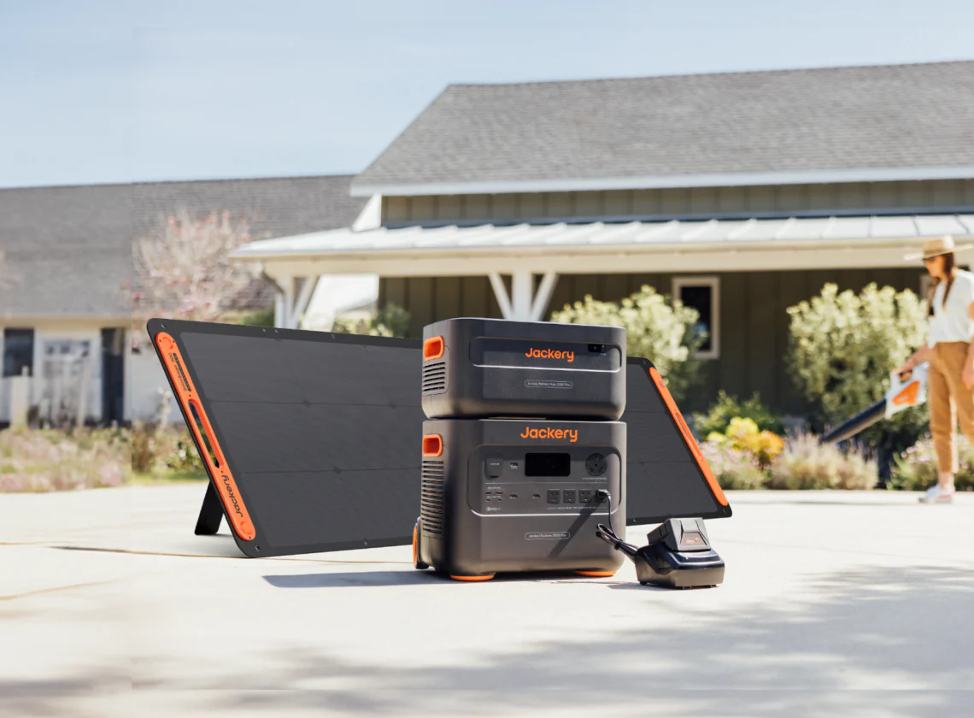Electricity has become an indispensable safeguard in our daily lives. The moment power outages happen, refrigerators shut down, essential devices like mobile phones and laptops can’t be charged, electronic medical equipment becomes nonfunctional, temperature regulation systems stop serving their purpose, and entertainment equipment ceases to work entirely. Without electricity, even the simplest activities become uncertain.
That is why it is important to have a household backup generator that can keep your life functional when power outages happen. Based on their capacities, these generators can operate a range of devices including essential equipment as well as high-end gadgets. Who mostly needs household battery backup? And how to choose one for your family? Today’s blog will give some suggestions.
5 Kinds of People Needing Household Backup Generators
For the following 5 types of people, a household battery backup is indispensable.
1. Homeowners in Areas Prone to Natural Disasters
If you are living in a region that faces frequent storms, floods, wildfires, or heavy snowfall, you are always prone to power outages. When a tree falls on an electricity line or a weather event damages nearby electrical infrastructure, the electricity supply can vanish in seconds. In many cases, power outages can last even for days.
Having a household backup generator allows you to maintain basic comfort and safety without waiting helplessly for the grid electricity. For example, you can maintain the operation of refrigerators, lighting, and heating equipment to ensure basic needs.
2. Remote or Off-Grid Living
If you live far from towns and cities, you would be well aware of power outages that can deny you even a basic lifestyle at times. The grid stability here is relatively poor, with intermittent power supply likely. Similarly, if you live completely off-grid, you will always need a reliable house backup generator that can help you live a normal life without any compromise.
A good quality house backup generator can help you run high-power devices such as refrigerators, ACs, or heaters, allowing you to maintain comfort far from the grid.
3. People Working from Home
The rising culture of remote work also necessitates the need for a house backup generator. A steady internet connection, charged devices, and a functioning workspace are the basic requirements of a home office, and a house backup generator helps you achieve this.
Without a backup power supply in the home office, you are always at risk of losing power during working hours, which can lead to data loss and missed deadlines.
4. Medical Needs
A household backup generator is also needed to run medical equipment in case of emergencies. If you or someone in your house uses electronic medical devices such as oxygen machines, CPAP devices, refrigerated medication, and mobility aids, you should have a household backup generator at any cost. This is due to the fact that even a short power interruption can have serious consequences for patients who rely on important medical gadgets.
5. Outdoor Enthusiasts
If you spend a lot of time in the backyard or use outdoor areas for gardening, barbecues, or small gatherings, a household backup generator becomes non-negotiable. The same backup generator can also accompany you during your travel plans when you visit the great outdoors of Canada and go hiking, camping, fishing, or spend a few days in a remote cabin where access to the grid is limited or unavailable.
Household backup generators can provide electricity for lighting, cooking equipment, mobile charging, etc., enhancing comfort and safety and making them particularly suitable for extended expeditions and outdoor activities.

How to Choose Household Backup Generators?
While choosing the household backup generator, it is essential to consider some important factors such as:
1. Power Requirements
The first thing to assess is how much power your home will actually need during an outage. Some families only need to keep a few essentials running, like lights, charging devices, and one or two other appliances. Others may want to power the entire home, including larger systems like air conditioners or electric heaters.
Understanding the wattage needs of your equipment helps avoid choosing the wrong system. First, list all the electrical appliances requiring a power supply, such as refrigerators, televisions, computers, air conditioners, etc. Then, calculate the rated power (normal operating power) of each device. Ensure the total combined power consumption of all these devices does not exceed your generator’s rated capacity while maintaining a reasonable safety margin.
2. Fuel Options
Generators come with different fuel types, and each option has its own pros and limitations. Gasoline-powered models are common and relatively easy to find, but they require proper storage and regular refuelling and are not suitable for home use. Propane generators are cleaner and quieter but need a steady fuel source.
Solar-powered generators bring the best of both worlds. They are gaining popularity because they don’t rely on fuel at all and are better suited for those who want a low-maintenance, environmentally friendly solution. Plus, solar household backup generators also operate quietly, which will help you maintain a peaceful environment in your house.
3. Charging Options
If you are selecting a rechargeable backup generator, it is recommended to choose a product that can be recharged in different ways. A good backup generator can be recharged through solar energy, a traditional AC wall outlet, as well as from the car battery, thus giving you the much-needed flexibility to tackle power outages or outdoor energy needs according to your preferences.
4. Key Features
There are some important features that should never be overlooked while buying a household backup generator. For instance, always look for a generator that includes quick UPS functionality so that you can switch to backup power during outages instantly.
Similarly, a household backup generator should be able to operate quietly. Conventional generators typically operate at 65-75 dB, comparable to vacuum cleaner noise levels. In contrast, silent generators function at 30-50 dB, making them suitable for nighttime operation.
Moreover, it should also be able to generate reliable electricity without posing any safety hazards. On top of that, any backup emergency generator you choose should be durable enough to provide you with dependable electricity for decades to come without needing any major repairs.
5. Budget
Finally, your budget plays a central role in selecting the best portable power station. It includes initial costs, fuel costs, and maintenance costs. Prices of the emergency generator greatly vary depending on capacity, power output and other features.
While it may be tempting to go for the cheapest model, a poorly built system can fail when you need it the most. Instead of only focusing on cost, consider what you are getting in return. A dependable backup generator is an investment that protects your home, your work, and your well-being during uncertain times.
Jackery Solar Generators – The optimal power solution for your home
Jackery brings the best household generators for emergencies that will allow you to tackle power outages and even go off-grid. Here are the two popular generators for household uses:
1. Jackery Explorer 5000 Plus Portable Power Station
The Jackery Explorer 5000 Plus Portable Power Station is designed to provide a full-scale backup solution for families who want uninterrupted power during extended outages. It delivers 5-60kWh of battery capacity and a high 7.2-14.4kW of power output, which means it can keep refrigerators, ovens, electric water pumps, dryers, electric vehicles, and many other appliances running without any trouble.
It offers several fast charging options, including charging via Smart Transfer Switch, high-voltage PV, and Hybrid Charging (AC, solar panels, and Smart Transfer Switch) in 1.7 hours, ensuring a worry-free power supply. It also features an uninterruptible power supply function that switches over to backup power in 0ms, which ensures that all the devices keep on running without any hitch.
The power station comes with a LiFePO4 battery and is engineered for long-term reliability. It maintains a 70% battery level after 4,000 charging cycles, making it a dependable piece of equipment that can last for over a decade under regular use. The built-in smart control system allows users to monitor usage, schedule charging, and adjust settings using a dedicated app, allowing you to control the whole system with extreme convenience.
With smooth wheels, a built-in handle, and a noise rating of only 30 decibels, it fits well into both emergency backup setups and everyday use. The system connects easily with Jackery’s solar panels, allowing you to replenish the battery with solar energy. This way you will quickly recover the capital household generator cost and enjoy the free electricity in times to come.
2. Jackery Solar Generator 2000 Plus
If you need a powerful system in a more compact form, the Jackery Solar Generator 2000 Plus is a strong choice. It starts with 2 kWh of energy storage but can be expanded up to 24 kWh with additional battery packs. This flexibility makes it ideal not only for home backup but also for off-grid living, mobile workstations, or outdoor adventures that require high power capacity.
The unit supports a peak power output of 6000 watts and a rated power of 3000W, which is enough to handle heavy-duty appliances like air conditioners, electric ovens, portable grills, sump pumps, and medical devices. Its LiFePO4 battery ensures a long lifespan of up to 10 years and stable performance even under high loads.
Charging its portable power station using solar energy is a seamless process. Using 6 Jackery SolarSaga 100W solar panels, you can completely recharge it in six hours. It can also be charged through a wall outlet or a car adapter, offering multiple options for different scenarios. The system is protected by Jackery’s ChargeShield technology, which manages charging speeds and battery health through an advanced algorithm that extends battery life and improves safety.
The unit operates quietly at around 30 decibels and is fire-resistant, shockproof, and designed for safe indoor use. It also comes with the instant UPS functionality, allowing the power station to start immediately in case of a power outage!

Installation and Maintenance Guide
Once you have selected the right household backup generator, the next step is to make sure it is set up properly and maintained in a way that keeps it reliable for years.
Here is a step-by-step guide on how to do it:
1. How to set up a Jackery solar generator?
Setting up a Jackery solar generator at home is a straightforward process and does not require any complex installation. Start by placing the portable power station in a dry, safe location inside the house where it stays protected from moisture. Make sure there is enough space around the unit for airflow.
Once it is positioned, connect the solar panel to the power station to make a solar generator. It will start charging and storing power using solar panels. After charging, you can plug your household appliances or devices directly into the multiple output ports available on the front panel.
2. How to install solar panels to increase power generation?
To get the most out of your Jackery portable household generators, choose a location where the panels can receive the most sunlight throughout the day. Ideally, place them in an open area such as the backyard, balcony, or rooftop, making sure that no shadows fall on them during peak daylight hours.
The recommended tilt angle is approximately equal to the local latitude. Remember to keep the panels clean and adjust their position from time to time to match the sun’s direction.
3. Daily maintenance tips for Jackery solar generators
Jackery generators are low-maintenance equipment, but checking them from time to time will help you extend their lifespan.
Store the power generator in a cool and dry indoor area when not in use. Avoid exposing it to extreme heat, direct rain, or freezing conditions. All Jackery generators come with a predefined temperature range, so make sure that you are using them within that specific range.
Recharge the battery every few months, even if you are not using it, so that it remains active and functional in the long run. Keep the solar panels clean by wiping off dust or leaves using a soft cloth. Check the cables regularly to ensure that there are no cuts or signs of wear. When using the generator during power outages, do not overload it by connecting more devices than its capacity allows. Taking small precautions like these will increase the durability of your system.
Wrapping-Up
A reliable household backup generator keeps your home running smoothly when the power goes out. With Jackery’s solar-powered solutions, you get quiet, clean, and dependable energy without the hassle. These generators keep you prepared even when the power outage lasts for days. So, if you want further electricity protection, visit the Jackery website to choose one now!




